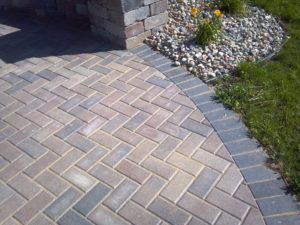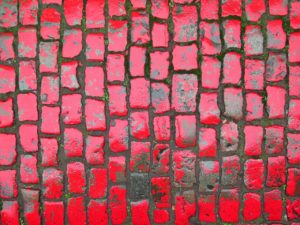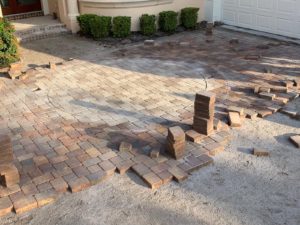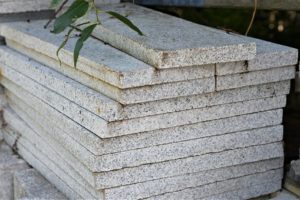Dark pavers are amazing. As much as paving stones, in general, share a handful of ideal properties that most American houses value, dark-colored ones are something else entirely – matching almost any kind of aesthetic and making for a beautiful curb. What is there to know about these products, though?
Well, that’s our topic for today. Keep reading the article to find out whether dark pavers are the right fit for you or not – and what materials are available for purchase.
Don’t miss: How Long Do Pavers Last?
Dark Pavers: What Are They Made Of?
Black pavers can be acquired in a variety of models – including natural stones, which are more expensive than traditional slabs but just as good-looking (and, sometimes, more durable, too). Check out some of them below:
Concrete pavers
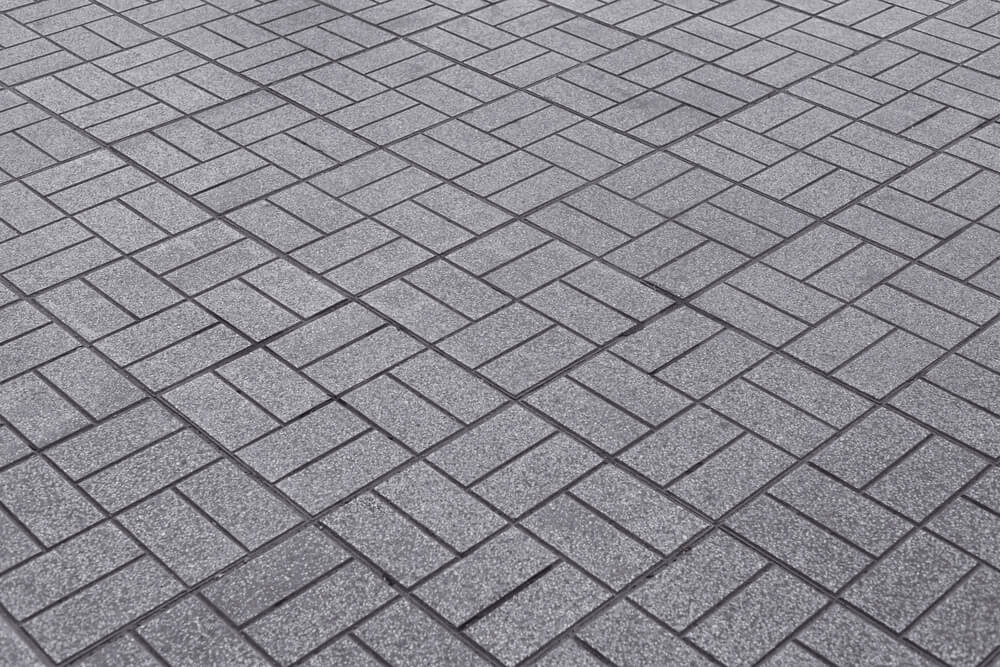
You can find concrete pavers in many colors, including black, but they are never as bright and pristine as natural options would (more on that in a bit). Still, you can find some dark options with ease. These pavers cost around $4 and $6 per sq/ft, with some particularly rare color schemes being able to reach up to $10 per sq/ft.
Porcelain pavers
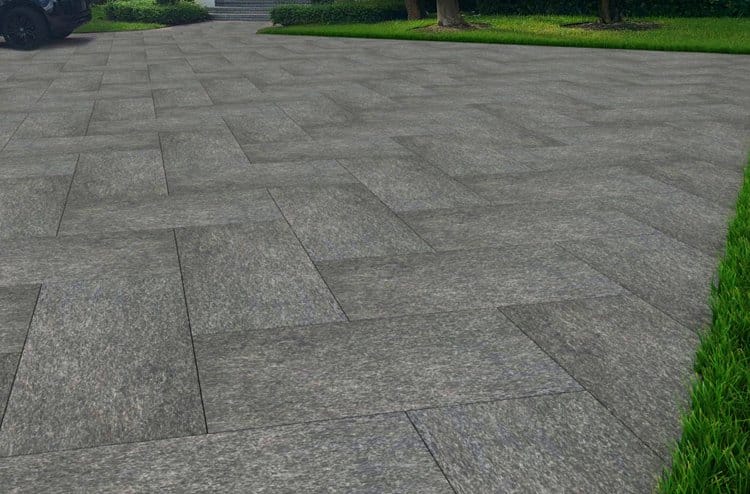
Concrete pavers might still be the most popular and better cost-benefit option, but porcelain pavers are starting to challenge the top position in the industry. They come at a higher cost, but they also offer so many maintenance benefits that they are starting to take space in the hearts of many homeowners. Porcelain pavers can cost anything between $10 and $35 per sq/ft, depending on the complexity and rarity of the design.
Brick pavers
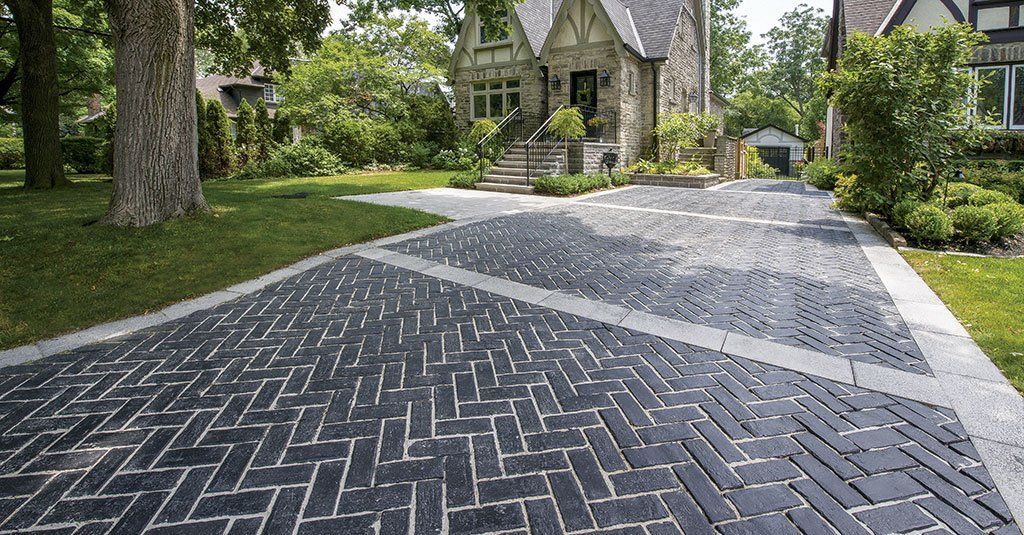
Brick offers a great variation of earthly shades and hues – including dark grey. Bricks are considered to be a very elegant and timeless choice, ideal for more rustic, smooth, and simple aesthetics. Modern designs often incorporate dark brick pavers to bring out that minimalistic look of executive surfaces we find at office buildings and so. Their price starts at $6 per sq/ft.
Slate
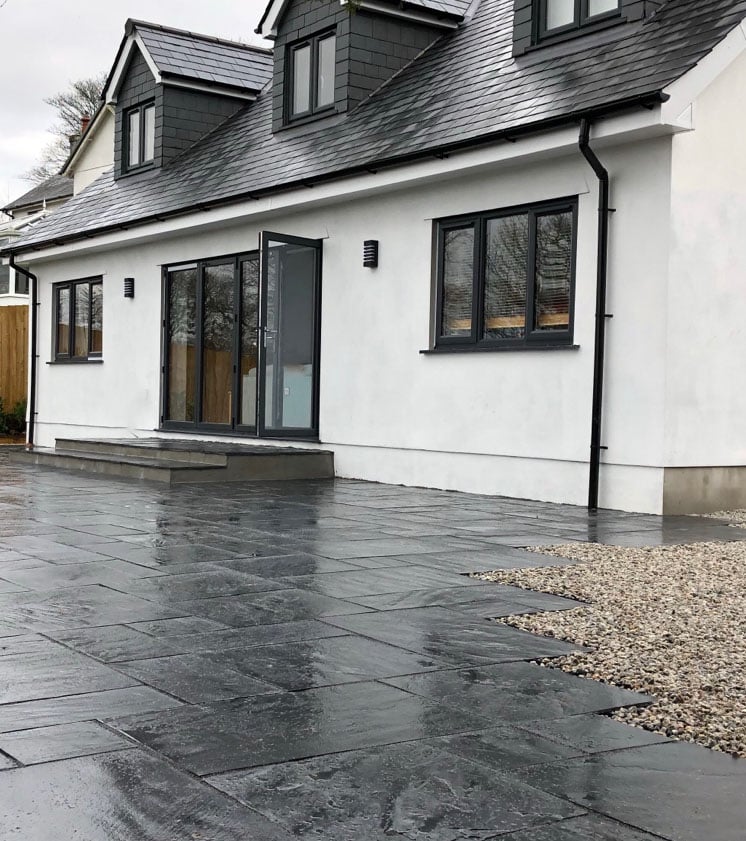
In our experience, slate is relatively unknown to most homeowners. Slate is a foliated rock with a smooth surface and a fine-grained texture. It can be a wonderful option for small outdoor patios and something many people would be impressed by – especially in their dark variation. Slate pavers cost anywhere between $15 and $20 per sq/ft.
Travertine
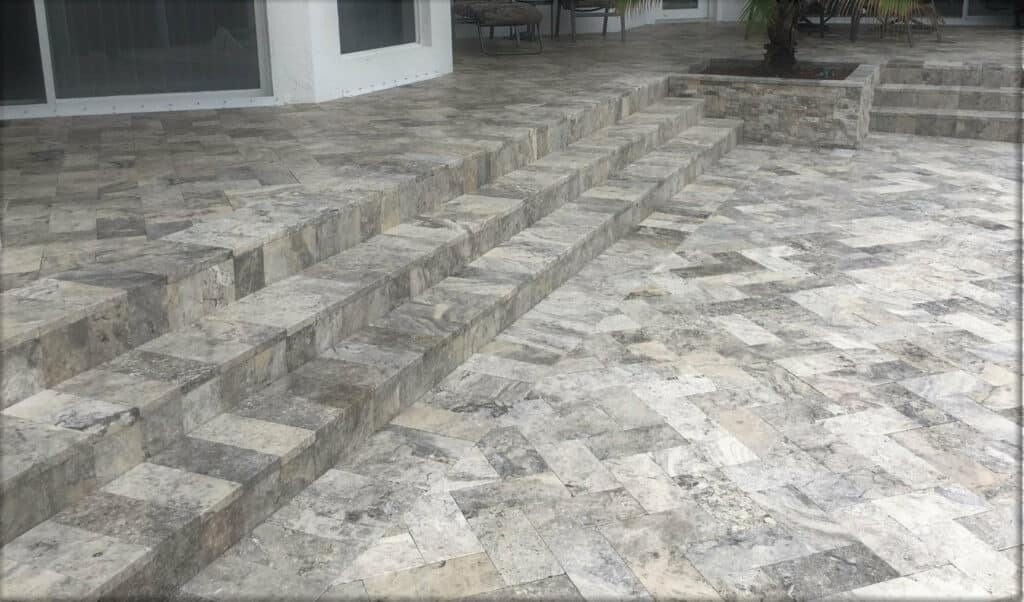
Travertine is the most popular of all these options due to how well they work with poolside installations. Homeowners who have installed pavers around their pool know firsthand the power of travertine pavers in that setting. However, whilst possible to find black variations of travertine, they will not be as black as the other options – starting at a very low price of $4 per sq/ft and reaching as high as $11 per sq/ft.
Marble

As luxurious natural stones, marble pavers are, perhaps, the most elegant of all choices. Marble, after all, is famous for its pristine look and classic aesthetics, particularly if you pair your flooring with a nice countertop. Dark marble is not exactly rare, but it can be more difficult to find than its vastly more popular white variation. Their price starts at $11 per sq/ft.
Pros and Cons of Dark Pavers
With that in mind, now it’s time to check out some pivotal factors in your buying criteria. Below, we’ve listed some pros and cons surrounding the use of dark pavers for your next project.
Pros
- they evoke a very dynamic contrast in home design;
- perfect to highlight corner accents and bold borders;
- they camouflage eventual dark stains;
- they match any other color in the ambiance;
- they increase your home’s resale value;
- warmer floor during the winter (due to heat absorption).
Cons
- maintenance is the same as white pavers;
- they might have a heavy visual impact on your neighborhood;
- they are prone to fade over time, especially under sun exposure;
- not the ideal fit for spots with barefoot activities, such as pool decks and barbecue areas, because of heat retention during the summer.
Read as well: Are Small Paving Stones Right For You?
Do We Need to Seal Dark Pavers?
Unfortunately for your budget, just because your floor is dark doesn’t mean that it’s protected from stains, fissures, moss growth, or even ant infestations. When placed outdoors, any kind of porous paver is vulnerable to climate conditions and organic residue, regardless of its color.
Therefore, yes – dark pavers, when made of porous materials, still need to be sealed regularly. Read everything about sealants in this article.
What pavers are included in this category, though? Well, out of the most popular hardscape products on the market, concrete and bricks are the main contenders – as well as some natural stones, which you’ve seen in the section above. Options such as porcelain and travertine, on the other hand, don’t need to be sealed.
S&S Pavers can give you a hand!
So, have dark pavers amazed you yet? We hope so. However, if you’re still unsure about this whole ordeal, think carefully before investing in a new patio or driveway – by this point, your options are endless, and every little detail counts.
Therefore, that choice should be helped by professional hardscape contractors. Our tip is to find one in your area that knows all the creative and technical logistics – don’t risk making any decisions without consulting someone with expertise first!
Here at SS Pavers, we have worked with countless installations over our 12 years of activity. As such, we have seen many structures with mistakes that could have easily been avoided – or optimized – if only a professional were involved in the first place.
That’s why we always recommend that people make the intelligent choice of protecting their investment and hiring a professional. And if you’re around the Sarasota and Manatee counties, in Florida, we would gladly help you with your project!
Give us a call anytime at 941-773-3098 or email us at sales@sspavers.com.

